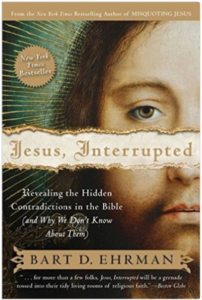By Bart D. Ehrman (Amazon)
 The New Testament, consisting of twenty-seven books, was written by maybe sixteen or seventeen authors over a period of seventy years.
The New Testament, consisting of twenty-seven books, was written by maybe sixteen or seventeen authors over a period of seventy years.
…
A Christianity dependent on the inerrancy of the Bible probably cannot survive the reality of the discrepancies.
…
Since the nineteenth century, scholars have recognized that Mark was the first Gospel to be written, around 65-70 CE.
…
We don’t know who wrote most of the books of the New Testament. But in fact none of the writers was an eyewitness, and none of them claims to be.
…
Nothing in the Gospels or Acts indicates that Jesus’ followers could read, let alone write.
The authors of the Gospels were highly educated, Greek-speaking Christians who probably lived outside Palestine.
None of the Gospels was written by a follower of Jesus.
…
And so we have an answer to our ultimate question of why these Gospels are so different from one another. They were not written by Jesus’ companions or by companions of his companions. They were written decades later by people who didn’t know Jesus, who lived in a different country or different countries from Jesus, and who spoke a different language from Jesus. They are different from each other in part because they also didn’t know each other, to some extent they had different sources of information (although Matthew and Luke drew on Mark), and they modified their stories on the basis of their own understandings of who Jesus was.
…
Our earliest surviving written accounts of Jesus’ life come from thirty-five to sixty-five years after his death.
…
What do Greek and Roman sources have to say about Jesus? Or to make the question more pointed: if Jesus lived and died in the first century (death around 50 CE), what do the Greek and Roman sources from his own day through the end of the century (say, the year 100) have to say about him? The answer is breathtaking. They have absolutely nothing to say about him. He is never discussed, challenged, attacked, maligned, or talked about in any way in any surviving pagan source of the period. There are no birth records, accounts of his trial and death, reflections on his significance, or disputes about his teachings. In fact, his name is never mentioned once in any pagan source. And we have a lot of Greek and Roman sources from the period: religious scholars, historians, philosophers, poets, natural scientists; we have thousands of private letters; we have inscriptions placed on buildings in public places. In no first-century Greek or Roman (pagan) source is Jesus mentioned.
…
Jesus believed his own disciples would be the rulers of the future, earthly, Kingdom of God.
…
Our first reference to Jesus’ tomb being empty is in the Gospel of Mark, written forty years later by someone living in a different country who had heard that it was empty.
…
We don’t have the originals of any of the writings of the New Testament.
…
The problem in the development of the canon of Scripture was that each and every one of the competitive groups of Christians — each of them insisting they were right, each trying to win converts — had sacred books that authorized their points of view. And most of these books claimed to be written by apostles. Who was right? The canon that emerged from these debates represented the books favored by the group that ended up winning. It did not happen overnight. In fact, it took centuries.
…
Not until the end of the fourth century — some three hundred years after most of the books of the New Testament had been written — did anyone of record indicate that he thought the New Testament consisted of the twenty-seven books we have today, and only those books.
…
“And so, just as I came to see the Bible as a very human book, I came to see Christianity as a very human religion. It did not descend from on high. It was created, down here on earth, among the followers of Jesus in the decades and centuries after his death.”
